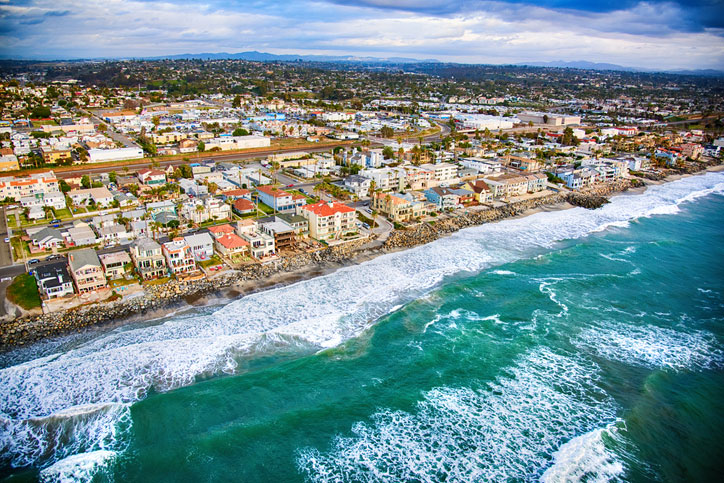Written by Helen Lewis

Interested in pursuing high-level work in mental health care?
Psychology is a meaningful and growing field of employment in the United States, with significant opportunities predicted over the next decade. California has a particularly high number of psychologists in the city, though still far from enough to meet the needs of its 39 million residents.
In the following article, learn more about the ins and outs of becoming a psychologist in California, including the benefits of pursuing a master’s degree in psychology and the average salary for a qualified psychologist in Oceanside, CA.
Welcome to Oceanside, California
Beachy Oceanside is a city in San Diego County, a region in sunny Southern California. Around 174,000 people live in this scenic and tourist-friendly area, just a fraction of the 3.3 million Californians who call San Diego home.
Oceanside is considered part of a “tri-city” area with Carlsbad and Vista, and is located near Orange County and downtown San Diego. As a coastal area, Oceanside isn’t as hot as some other parts of Southern California, such as the desert regions of Palm Springs or the San Fernando Valley. Instead, Oceanside is characterized by cool sea breezes, with a high temperature of around 77º F.
Mental Health Care in California

California’s mental health care system is in a moment of evolution.
As in many parts of the country, the outbreak of the COVID-19 pandemic demonstrated just how much mental health care matters. From experiences of stress and loneliness to severe mental health crises, people in the Golden State demonstrated significantly more need for mental health care than they were able to receive.
One of the most commonly-cited explanations for the current challenges faced by California’s mental health care system is understaffing. One contributing factor is burnout, which became a serious concern for mental health care providers during COVID-19. Another factor is that more people are seeking mental health care than before. This could have a number of root causes, ranging from greater stressors (such as the COVID-19 pandemic) to a widespread de-stigmatization of seeking mental health care, as American people – and particularly young people – speak more freely about mental health, therapy, medication, and mental illness than generations before.
Today, psychology is considered a growing field.
According to the Bureau of Labor Statistics, the American workforce in psychology is expected to grow by 7% between now and 2033, or a projected 13,000 jobs each year.
Life as a Psychologist in Oceanside, CA
Psychologists in California earn more than their peers in almost every other state.
(For exactly how much psychologists in Oceanside earn, see the below section: “What Does a Psychologist in Oceanside Earn?”.)
This rewarding career path provides a wide range of opportunities for ambitious professionals, particularly those who like feelings of versatility and flexibility in their working environments. For example, psychologists can have jobs in settings ranging from mental health clinics operated by the US Department of Veterans Affairs (or VA), to hospitals, private practices, and clinics. Psychologists can work in research labs, schools, rehabilitation centers, nonprofits, or even corporate settings.
Finding a Specialization: Clinical Psychologist or Child Psychologist?
Like many other health professionals, psychologists have the ability to follow a particular path of developing expertise based on their skill sets and interests.
These paths – sometimes called specializations, though the American Psychological Association prefers the phrase “specialties, subspecialties, and proficiencies” – begin in educational contexts.
Typically starting in grad school, students have the opportunity to tailor their course of study based on the specialization they’re interested in pursuing.
This may start as early as the application process. Many master’s and doctorate programs in psychology are specific to various specializations: for example, students can choose to pursue a graduate program with a name like “Mental Health Administration,” “Forensic Counseling,” or “Marriage & Family Therapy.”
These designations mean that a student will complete a specific course load, one that – in Psy.D and Master of Arts (MA) programs – is focused on teaching students about theory and how to apply lessons of psychology in the context of direct patient care. For Ph.D and Master of Science (MS) programs, students will be more focused on learning about how to properly conduct research, completing a certain number of lab hours, and demonstrating proficiency or excellence in quantitative reasoning.
Some programs, however, do not have hyper-specific specializations from the outset. A number of programs are offered around the state of California in “Clinical Psychology,” a title that can hypothetically be applied to a wide range of specializations, including Child and Adolescent Psychology.
LGBT Friendly Psychologists: Is That a Specialization?
According to the American Psychological Association, psychology focused specifically on providing mental health care to lesbian, gay, bisexual, and transgender (LGBT) individuals is not currently its own specific specialization.
However, there are many ways in which this area of expertise may intersect with other officially recognized parts of psychological practice. Moreover, supportive universities are beginning to offer specialization tracks that offer students the ability to develop LGBT-affirming care as a cornerstone of their work.
For example, Antioch University – a private institution in Culver City, California – offers an MA in Clinical Psychology with an emphasis on LGBT-Affirmative Psychology. This program allows students, powered by additional lessons in how to support LGBT patients, to choose between pursuing Marriage and Family Therapy or Clinical Counseling.
Similarly, Palo Alto University offers an “LGBTQ Psychology Emphasis” as part of their Ph.D program in Clinical Psychology. This is not the only emphasis they offer, but it is a pathway that is available to future psychologists interested in pursuing this particular line of mental health care.
Serving the Active Duty and Veteran Population in Oceanside

Oceanside, CA, is home to a significant active duty and veteran population, thanks to its proximity to Camp Pendleton, one of the largest Marine Corps bases on the West Coast. As a result, mental health professionals in Oceanside, especially psychologists, have unique opportunities to work with both active service members and veterans facing a range of mental health challenges.
These challenges often include post-traumatic stress disorder (PTSD), depression, anxiety, and the psychological impacts of military service. Many psychologists in the area choose to work in collaboration with the U.S. Department of Veterans Affairs (VA), providing specialized care to veterans through VA clinics and medical centers.
This is a growing field in Oceanside, as both the military and veteran populations require skilled mental health professionals to help them navigate the complexities of transitioning back to civilian life, coping with trauma, and maintaining overall well-being. Working with this population offers both rewarding career opportunities and the chance to make a meaningful impact on those who have served the country.Getting a Master’s in Psychology
Getting a Master’s in Psychology
For almost any job in psychology, applicants will have to meet a series of requirements. Across the board, it is reasonable to assume that those requirements will include:
- A bachelor’s degree from an accredited university
- A graduate degree from an accredited university (master’s or doctorate)
- A license
In order to become a licensed psychologist in California, it’s also necessary to pass two exams (the Examination for Professional Practice in Psychology, or EPPP, and the California Psychology Laws and Ethics Examination, or CPLEE).

Generally speaking, practicing psychologists have either an MA or MS in psychology, though most senior-level psychologists attain these master’s degrees as part of the process to becoming Phds or Psy.Ds. These doctoral degrees are necessary to practice as a clinical psychologist, but many other roles – such as a therapist, a counselor, an industrial-organizational psychologist, and, in some cases, a forensic psychologist – only require applicants to have an MA or MS.
There are many well-regarded graduate programs in psychology across California, including two in San Diego: California State University, San Diego (Cal State, San Diego) and University of California, San Diego (UCSD). These programs offer a Phd in Clinical Psychology, an MA in Psychology, and an MS in Applied Psychology.
What Does a Psychologist in Oceanside Earn?
Psychologists in Oceanside, CA have the opportunity to earn fantastic incomes, well above the annual average across all occupations for workers in the San Diego-Carlsbad metropolitan area.
According to the Bureau of Labor Statistics (BLS), the average clinical or counseling psychologist in this area earned $147,760 in 2023.
School psychologists earned considerably less but still a comfortable six figures, with a mean salary of $103,330.
Within the category of “psychologists, all other” – terminology that refers to psychologists included in the study who do not match any of the other identifications – the average annual income was $121,780.
These salaries are all well above the national average for psychologists, which – according to BLS data – falls around $92,740 annually.
2023 US Bureau of Labor Statistics salary and employment figures reflect state data, not school-specific information. Conditions in your area may vary. Data accessed October 2024.
